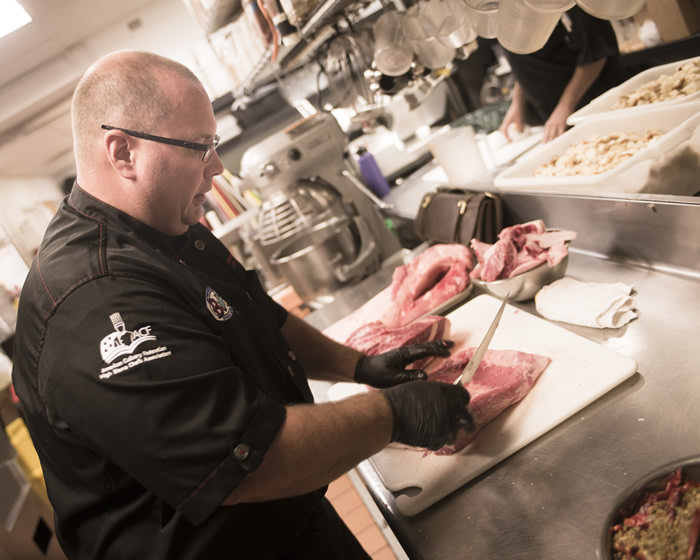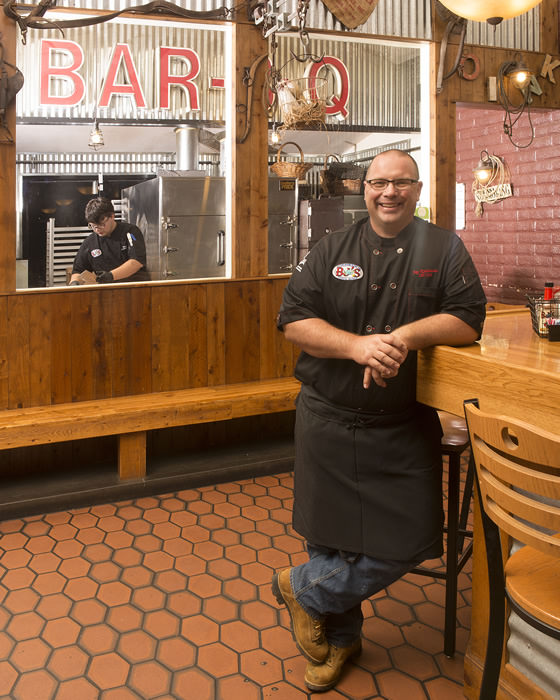Executive chef Jay Rathmann champions epicurean quality.
Having grown up in the restaurant business, Jay Rathmann always has had a fondness for both delicious food and the hard work that goes into its preparation. His parents, Roberta and Peter, have owned BJ’s Nevada Barbecue Co. in Sparks for nearly 30 years, instilling in their son a meticulous business mentality, community commitment, and strong sense of follow-through in all that they do. Rathmann has drawn upon his passions and the many lessons his parents passed along to him to make a substantial difference in the culinary careers of many students working their way through local vocational programs.
Rathmann is the busy owner and executive chef of BJ’s and president of the American Culinary Federation High Sierra Chefs Association; proudly holds several executive chef certifications; helps rehabilitate those from the penal system; and generally excels as an amazing leader in the Reno-Tahoe food scene.
But, according to Rathmann, instead of doing so much for the public praise, he does it all because it’s just the right thing to do.
Next generation of chefs
The American Culinary Federation has accredited the culinary arts programs at the Academy of Arts, Careers and Technology and Truckee Meadows Community College, both in Reno. This designation allows culinary students the opportunity to learn the ins and outs of running a restaurant, including cooking, culinary health, business, and hospitality from the pros.
“Students thrive because they’re not working with their mothers to learn how to be professionals in the kitchen. We take the time to show them the industry best practices and help mold these young chefs for the outside world,” Rathmann says. “At the end of the day, [your reputation is] based on the product you’re putting out. When you’re cooking for your family and you burn something, it’s not a big deal. If you burn something for the public, it creates a big problem.”
Rathmann spends his time at each school, teaching everything from basic knife skills and cleanliness to proper table settings and balancing bank accounts.
“One of the biggest downfalls in the industry right now is that everyone is opening [businesses], but there’s no labor,” he adds. “We try to prepare the kids for the fast-paced kitchen. We want them to uphold clean, sanitary standards and be professional. The volunteers, staff, and students at both schools work together as a team so they’re able to absorb what they’re learning and they understand why each lesson matters in the real world.”

Rathmann, who holds a curing certification, trims brisket in preparation for making corned beef
From-scratch mentality
With the exception of the pasta in the barbecue macaroni salad and a few other odds and ends, everything that comes from the kitchen at BJ’s Nevada Barbecue Co. is made in house.
“We take a lot of time and make everything based on our recipes. When creating the menu, I didn’t want what everybody else had. I didn’t want to offer a cheeseburger and have the same meat and bun served somewhere else in town. Legitimately, you can only get what we serve here. And it’s always delicious,” Rathmann notes.
Since the staff members do not use prepared ingredients, the restaurant is considered high risk by the Nevada Division of Public and Behavioral Health and uses the U.S. Food and Drug Administration’s Hazard Analysis Critical Control Point management system to ensure the safety of food, from production to consumption. Rathmann embraces the standards and then some.
“In order to offer authentic, homemade food, you have to uphold some pretty strict standards in the kitchen,” he says. “We always go above and beyond these safety measures and offer some pretty kick-ass food in the process.”
Rathmann used much of what he learned to earn the prestigious Certified Executive Chef and Certified Culinary Administrator designations from the American Culinary Federation, as well as that of Worldchefs Certified Executive Chef from the World Association of Chefs Societies.
“Working with mentors to earn these certifications has opened my eyes to a lot of things, including the importance of genuine cooking and helping those who can learn from you,” Rathmann says.
Restitution rights
According to Rathmann, anybody who’s willing to commit him or herself anew should be given the chance. That’s why he’s worked with the penal system to employ several folks who have come from correctional centers.
“We pick members up to be dishwashers and busboys. A few who started with us five years ago are line cooks now. If they’re capable and want to learn, we want to foster them,” he says. “We work with a lot of good guys who have come over and stuck with us. We’re very fortunate in that aspect.”
Rathmann works seven days a week and is constantly looking for ways to make the culinary community better. He encourages people — whether it’s volunteering with youths, spending time bettering a local neighborhood, or focusing on a passion project — to stay busy and make a difference every single day. After all, he says, being busy with making a difference is a good problem to have.
Heidi Bethel is a freelance writer who enjoys mentoring the children in her life and watching as they excel in the kitchen and in their studies.


